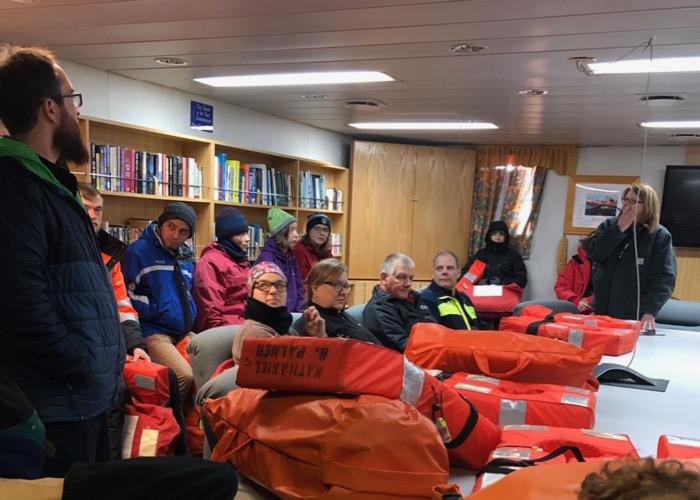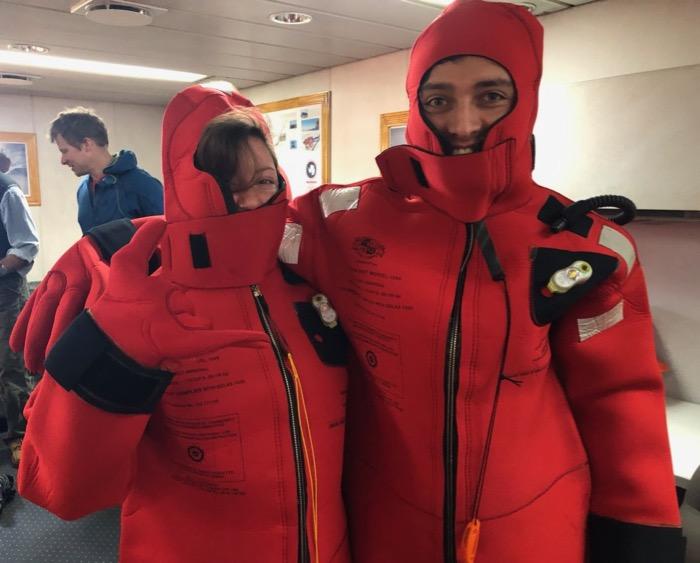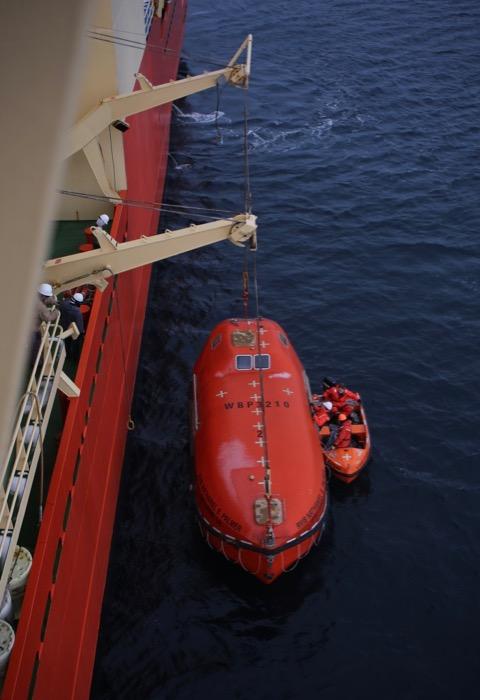Safety First
Just like at school, here on the ship we practice what we'd do in an emergency. We have drills that simulate what would happen in case of a fire, a person overboard, or if we ever we had to abandon ship. As a passenger, drills mostly involve us grabbing a life jacket, a float suit (nicknamed a Gumby suit), and any additional cold-weather gear from our rooms and heading to our muster (or meeting) location, where a member of the crew is waiting to give us instructions.

During the first drill, we also had to practice putting on the Gumby suit that would help keep us alive for a slightly longer time if ever we were adrift in Antarctic waters. With nearly 40 people in a small conference room, it was like a massive, awkward Twister game where instead of trying to put your right foot on a green circle, everyone's goal was to successfully don this thick neoprene costume with a high neck, full hood, and - no matter your size - inappropriately large gloves. Plus, at the time, everyone was seasick.

Since then, passengers have also practiced boarding the lifeboats - the Palmer has two of them, suspended from both the port and starboard side of the 04 deck. Each lifeboat is fully enclosed, as passengers probably wouldn't make it very long floating around in an open boat in the Amundsen Sea, and there is no possible way for a rescue mission to reach us right away. The boat is bare-bones - enough to keep us afloat and alive, but just barely. Someone asked if we could bring books with us, if ever we had to abandon ship. The Chief Mate said, "Do you want to read or do you want to live?" I guess there isn't room for books (hope everyone wants to hear me recite The Lorax - right, Jack and Em?). As I firmly strapped myself into my individual hard wooden seat, I thought about how awful it would be to try to survive without the abidingly fierce strength of the Nathaniel B. Palmer protecting me. In a real lifeboat situation, each person would be given just enough water to take two Dramamine pills, and then we wouldn't have anything else to eat or drink for 24 hours. Why? To minimize our consumption of limited resources and to cut down on the number of times people had to use the bathroom. And by "bathroom," I mean "bucket."

The crew often practices procedures for emergency operations without involving the passengers. On a slightly overcast day last week, they actually launched the lifeboats and rehearsed a person overboard drill. The Palmer came to a full stop in an area of still water and the majority of the crew mustered on the bridge. The captain and watch leaders described the plan for the drill and reviewed the responsibilities of each person - who would be manning the small lifeboat, who would operate the winches that lower the large ones, which people would go in each boat, what safety gear to bring, etc. At the end of the meeting, the captain asked, "Is there anyone here who feels uncomfortable with their assignment? Is there anyone who feels their duties will put their personal safety or the safety of others at risk?" Everyone said no, and then the crew got to work. It was interesting to watch the process unfold, but again, I imagined a real scenario in which the lifeboats would have to be deployed - and the picture in my mind didn't include calm seas and organized meetings. I'm so grateful that the captain and crew take seriously their responsibility for keeping us safe, right down to their focus during every minute of the drill. It was truly impressive.




Comments